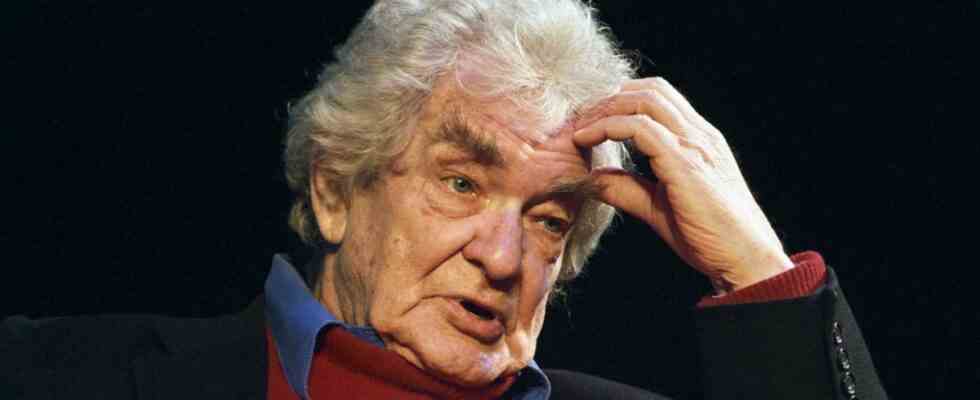After the military coup in Turkey, Emine Sevgi Özdamar, then a young Turkish actress, really wanted to go to the famous director Benno Besson – in the early 1970s for many left-wing theater people, for example the most important theater man in the world and the most influential student of Bertolt Brecht. In one of her novels, Özdamar, this year’s Büchner Prize winner, describes how she waited for hours in the foyer of the East Berlin Volksbühne for Besson. When he finally comes, she plucks up courage: “Herr Besson, I said, I came to learn the Brecht theater from you.” As she walks through the city afterwards, she “becomes lighter and lighter. My arms had become wings. I was a bird that would fly over East Berlin and look at every street that Brecht and Besson have ever walked and laugh with joy becomes.” Besson’s theater must have had a similar appeal to many people at the time, and meeting him was life-changing for Özdamar.
On Friday, the Berlin Volksbühne, the house where Besson made his anarchic-socialist world theater in the 1970s, celebrated the 100th birthday of the great director, who died in 2006. Besson’s daughter Katharina Thalbach arranged the cheerful, completely nostalgia-free evening. Two of her siblings sit with her on stage, the writer Philippe Besson and the actor Pierre Besson. “Benno loved children, food, women and theater – and plenty of everything, that’s why we are six siblings,” explains Thalbach: “Benno only saw through life when it was played.” When Besson’s companions, the actors Hermann Beyer and Christian Grashof, the stage designer Ezio Toffolutti or the actress Walfriede Schmitt, talk about their time with Besson that evening, one suspects that his theater will be a great adventure, a great pleasure with occasional rows and at least must have been the most important and beautiful thing in the world for those involved for a few years. The writer Christoph Hein reports how he ambushed the director at the stage exit in the early 1960s because he absolutely wanted to assist him. Hein’s journey into professional theater began with Besson’s assistant directorship.
The young Swiss socialist was fascinated by the young GDR – and Brecht was fascinated by him
In Switzerland, Besson had done left-wing amateur theater at a young age. This was apparently so interesting that Brecht, who had returned from emigration, invited him to go with him to the devastated Berlin in 1949. Besson, the young Swiss socialist, is fascinated by the young GDR – and Brecht is apparently fascinated by the playful talent of his most gifted pupil. When Brecht got his own theater with the Berliner Ensemble, he did not open it with his own production, but with Besson’s performance of Molière’s “Don Juan”. Besson stayed in East Berlin for 28 years, he directed at the Berliner Ensemble, went to the Deutsches Theater after Brecht’s death and switched to the Volksbühne in 1969. During these decades, the Swiss was the most important GDR director with enormous international charisma. His highly virtuosic productions combine the lightness and sophistication of the commedia dell’arte with Brecht’s anti-capitalist parables. They are worlds away from the gray dogmatist theater of dogmatically rigid Brecht imitators and the doctrinaire narrowness of GDR cultural policy. Besson’s performances are celebrated by audiences, loved by actors, and tolerated rather than appreciated by officials. One of his legendary productions, the fairy tale parable “The Dragon” by the Soviet playwright Yevgeny Schwarz, is a 1965 reckoning with Stalinism in the form of a fantastic fairy tale. At that time, Besson’s assistant director was a young songwriter from Berlin: Wolf Biermann. With almost 600 performances, an invitation to the West Berlin Theater Meeting and a celebrated guest performance in Paris, the performance became a worldwide success.
At the Volksbühne, Besson makes the most exciting theater in the country, with anarchist spectacles, plays by Heiner Müller and attempts to make theater together with industrial workers. In 1977, annoyed by the unreasonable demands of a provincial GDR bureaucracy, he resigned as director of the Volksbühne and went to Paris. Not only because, for example, the young Frank Castorf was a regular visitor to Besson’s Volksbühne as a student and learned a lot for his own theater there, is Besson’s theater still effective today. In a recently published research volume of the “Leipzig Contributions to Theater History” one can read how Besson wanted to overthrow the old hierarchical order: “We don’t just produce performances, we also change the conditions in the theater and the characteristics of the people who work in the theatre .” That sounds exactly like today’s debates about theater work that is as democratic as possible.

